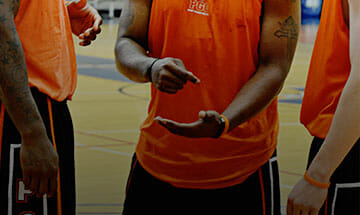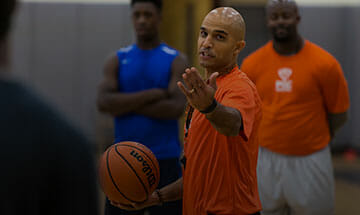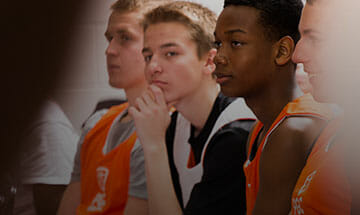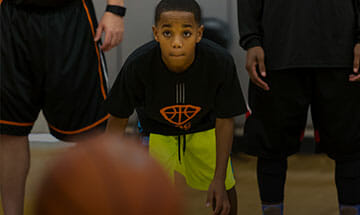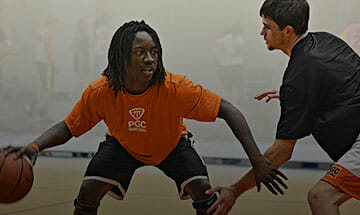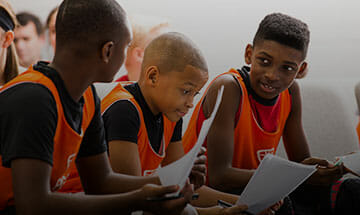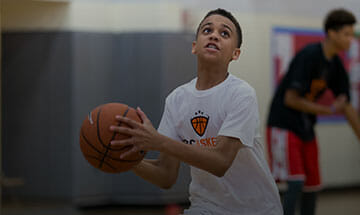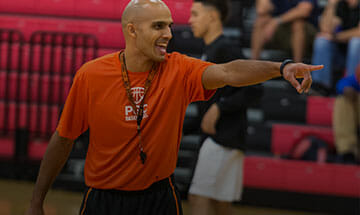The founder of PGC Basketball, Dick was a highly decorated high school and college player who was regarded as the prototypical “coach on the court.” He was named as the best high-school point guard in America by Parade Magazine and went on to earn Academic All-American and Atlantic Coast Conference (ACC) all-star honors at Duke. Later, he played and coached professionally in Europe and South America.
An English major and lover of literature, Dick authored five books during his lifetime—including STUFF! Good Players Should Know, praised as “the ultimate guide to playing the game the right way” by Larry Brown, the only coach ever to win both NCAA and NBA championships. Devenzio was considered by many to be a basketball genius, and Dick’s books continue to influence basketball lovers all over the world and have been translated into several foreign languages.
During college, Devenzio began running his own summer basketball camps, and he continued to offer sessions every summer until his sudden death in 2001 at just 52 years of age. The program he was most proud of, however, was the nationally acclaimed Point Guard Basketball College, the predecessor of PGC Basketball. Although Dick’s ingenuity, humor, and creativity are missed, his principles, ideas and teaching remain at the core of PGC's programs.
How to Coach Your Teammates
If you want to instruct in a way that is really going to help your basketball team, you need to instruct before the bad thing happens, before the play takes place. In basketball, this opportunity—or failure—happens frequently.
Champions Welcome Unfairness
Welcoming unfairness is one of the most useful principles in the life of any athlete. Champions don’t want to be put on an equal plane with others, they welcome the opportunity to show what they are made of under all sorts of conditions.
Take Some Thinking out of Basketball
Basketball is a thinking game but, as a coach, one of your major responsibilities is to take as many situations as possible out of thought processes and turn them into quick reactions requiring no thought at all.
How to Get Better at Basketball
There’s something propelling about being up and outdoors, or in a field or on a court—some place away from home—at six in the morning. I used to think of it as “getting ahead” time. At six in the morning the streets in my little town were quiet. Often, it was still dark. But I was out there practicing and it felt good.
How to Beat a Double Team
It is merely a matter of how you think. If, at the moment you see a double-team form, you think, “Oh no, a double-team!” you are likely to panic and throw a lob pass somewhere that someone can intercept.
Why do we have to go to school?
Hey, why should you have to study geometry? You’ll never need that stuff. I’ve heard kids say that their fathers sold insurance and never once used geometry. Or their fathers built cars and they never once were asked about ancient history. Smugly, all sorts of kids say and think they will never again need some random stuff they are supposed to learn in school so they feel justified in passing it off and not bothering to learn it.
How to Plan for Success on the Basketball Court
Scientific experimentation has shown conclusively the value of setting goals. If you have to prepare and mail a thousand letters, and if someone else who works exactly like you has to do the same, you can get your letters done faster by having your thousand in stacks of ten and the other guy’s letters in one stack of a thousand. If he has the stacks of ten and you the one stack of a thousand, he will do his faster.
Give Your Basketball Players Opportunity to Lead
You need to give your players a realistic opportunity to demonstrate their leadership. Give them some leeway, some space. Make all the corrections and criticisms that you have to. Just hold them for a defined period of time now and then so your players have a chance to show you what they can do. You can’t expect your players to take initiative if you are always taking it for them.

